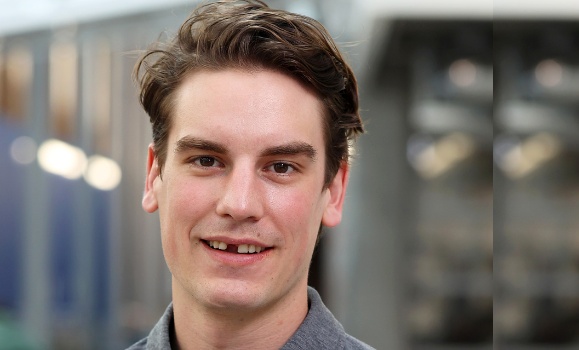News
» Go to news mainEngineering Grad Takes Action

WHEN DALHOUSIE MECHANICAL engineering grad Liam Maaskant (BEngā22) co-founded Axtion Independence Mobility with business savvy partner Tracey McGillivray, his career path took a new turn.
Once a former defencemen with the Ontario Hockey League and former Captain of the Acadia Axeman hockey team, Maaskant never imagined heād one day launch an up-and-coming medical device start-up company. But while completing the first two years of his engineering degree at Acadia University, he received a phone call from McGillivray whom heād previously met through Acadiaās Athletics Program.
She wanted to discuss the design of a mobility device that would allow her father to live more independently. Although her father already used a walker, he had been experiencing regular falls at home, and wasnāt able to get back up on his own or with assistance from her mother.
Now, two years later, Axtion Mobility is set to revolutionize the rollator walker so that it can better help its users in the prevention and recovery of falls.
Headquartered in Dalhousieās Emera IDEAhub, Liam and Tracey have teamed up with experts at the Hub to design a mobility device that combines a four-wheeled rollator walker with a mechanical seat to help those who have fallen get back up on their own with minimal assistance. Theyāve also teamed up with Occupational Therapist and Dalhousie alum, Suling Duong, who opened their eyes to new possibilities for the device.
āShe really paved the way for what our device could do and all of the features it could help with,ā says Maaskant. āI came in and I was really focused on just getting a seat that lifts. I didnāt see all of the constraints that it had to meet. So for example, lowering the seat flush with the ground.ā
āOur design started as a fall recovery device and then moved into something that could support users in their daily activities,ā he adds. āSo users transferring themselves on and off a couch or a bed for example. Then lifting themselves back up to a position that is much easier to stand from.ā
Capstone Collaborations
These new possibilities meant new opportunities for two groups of Dal engineering students working on their senior year Capstone projects.
Each year, Dalhousieās Capstone program matches engineering student teams with industry partners to design innovative solutions to real-world challenges. Their projects typically involve open-ended problems that companies may not have the resources or expertise to tackle alone.
Maaskant, who graduated last week from Dalās mechanical engineering program, was also required to complete his Capstone project this year.
As co-founders of Axtion, he and McGillivray saw the Capstone program as an opportunity to partner with students and gain a fresh perspective on the design of their device. With the goal of completing their prototype for testing by this summer, Maaskant says the deviceās braking system and a strong, foldable seat for the lift still needed to be designed. So, they teamed up with two student groups from the mechanical engineering program to work on each component of the project. One of those Capstone teams included Maaskantās group. He, along with his three teammates, Matt Ingham, Will Houser, and Adam Dorrance, were tasked with building the deviceās braking system.
āFor me, I love working with my peers. I guess itās very valuable to me. Going through school you learn a lot from class lectures, but you also learn from your study groups and meeting up with your peers,ā he says. āMatt, Will and Adam have really come on board and taken control,ā he adds. āTheyāre the brains of the operation, so I learned a lot from them and from their concepts. I was ecstatic with how much input they had and how much value they added to the product.ā
At the same time, Danielle Dey and her teammates, who included Aya Ghalib, Lara Mullally and Ben Abraham were responsible for designing a mechanical seat for the rollator walker. Taking into account a list of general requirements including building a foldable product that can also support the full weight of its users as it lifts up and down, Dey says both Maaskant and McGillivray have given their team the freedom and confidence to experiment with their design.
āHe (Maaskant) has taken a backseat in terms of directing us and he lets us have the freedom to really make big changes as opposed to having a specific direction they want us to go in,ā she says,
With the deviceās brakes and seat now ready for action, Maaskant says itās been a unique experience working as both an industry partner in the Capstone program, and a member of one of the student teams.
āIām part of the team and I never really wanted to be the boss. All of those guys have done a really great job and are doing things that I probably wouldnāt have thought of or wouldnāt have been able to do originally,ā he says. āFor us we couldnāt have been happier.ā
Recent News
- Engineering Young Alumni Reception
- Students scale new heights with Toronto tower pitch
- Dalhousie Students Develop Automation Tool for Irving Shipbuilding
- 2025 Capstone Poster Expo
- Dalhousie Engineering Students Lead the 2025 Canadian Engineering Competition
- āA painless flash of lightā: Biomedical Engineering student wins 3 Minute Thesis
- Sparking a Passion for Indigenous Engagement in Engineering
- 2025 Engineering Student Experience Showcase
